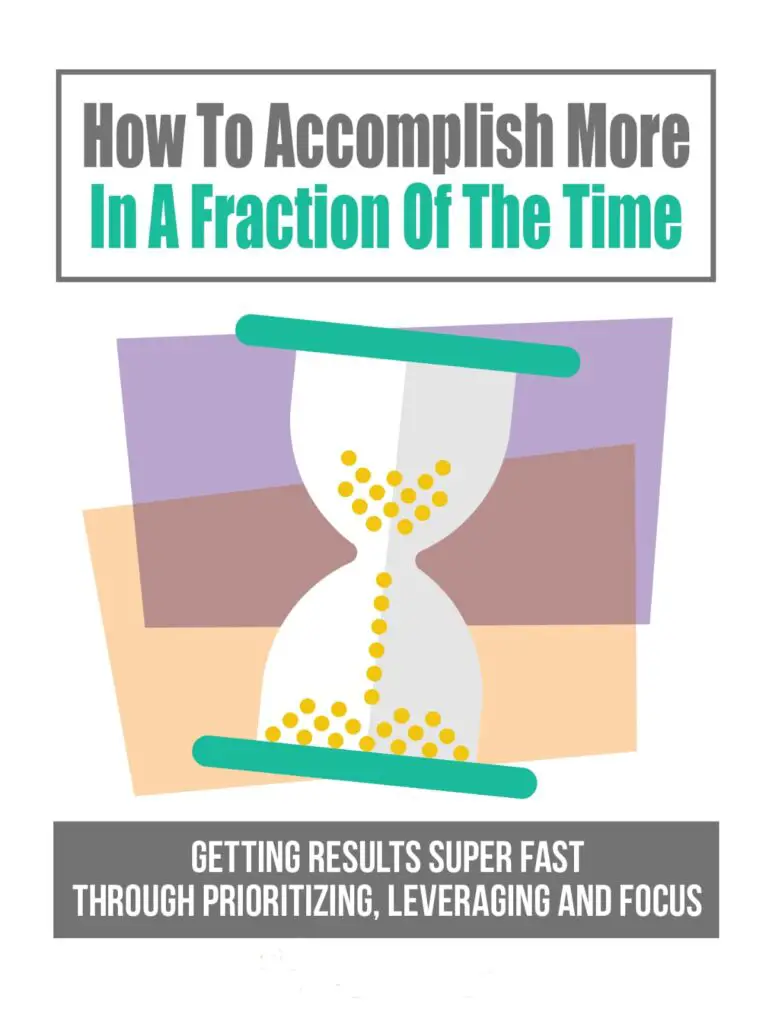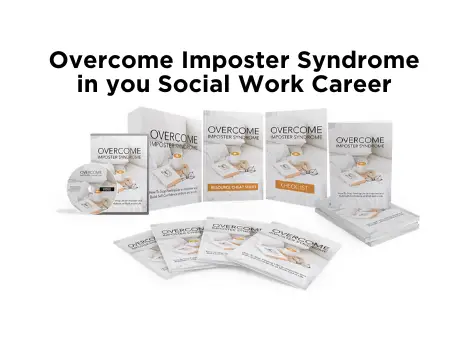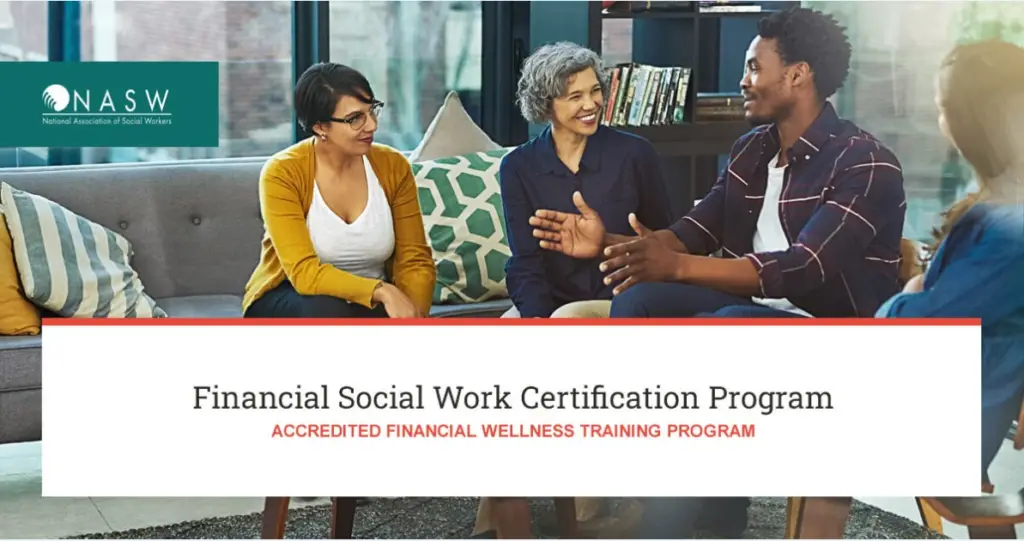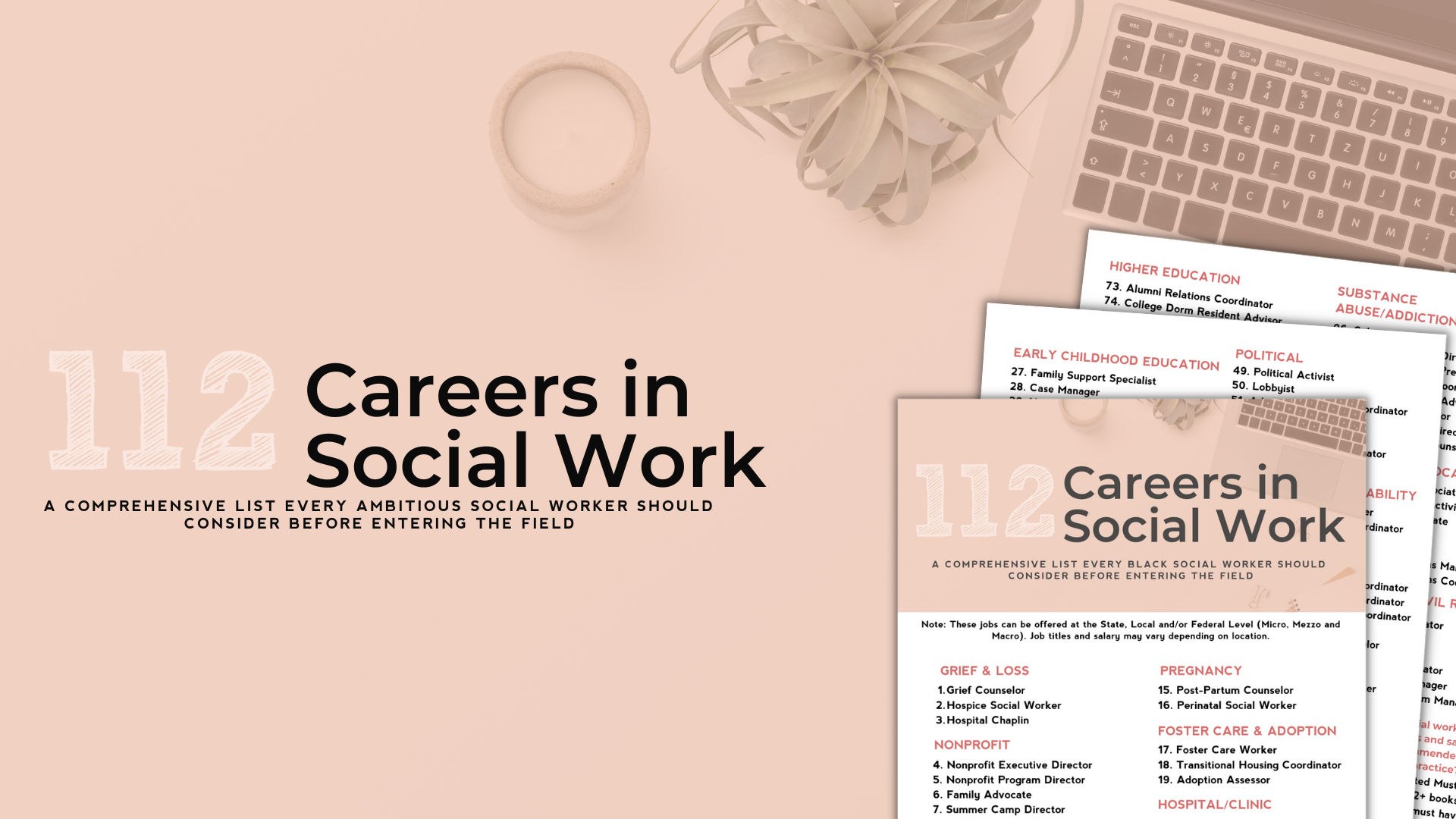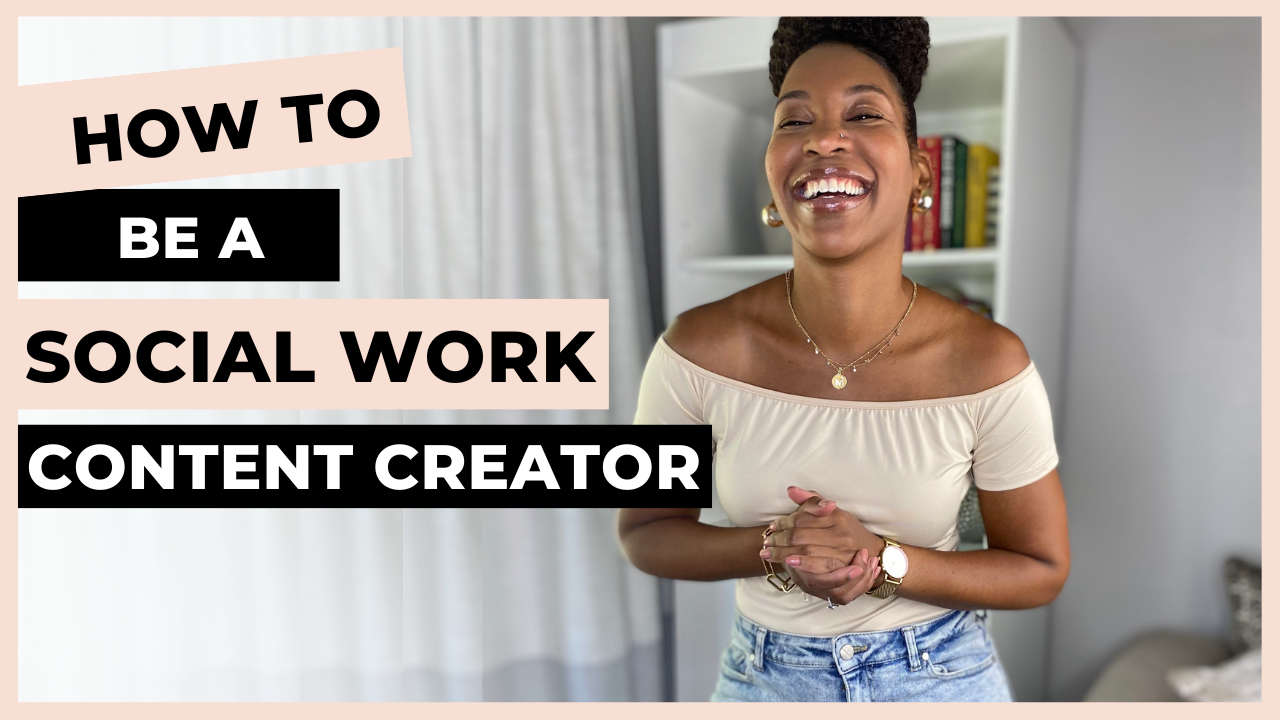
Stepping out on your own as a Social Worker can be scary. Why, because we were taught all the skills and knowledge around advocating for clients, empowering others, and fighting for Social Justice, but nowhere in our curriculum were we taught how to take our knowledge and skills and turn that into a thriving business. So, I want to share with you a step-by-step guide on how you can use your degree to make a difference in the lives of those who you were called to serve, while also pursuing your desire to become an entrepreneur. My goal in sharing this with you is to help you create a more fulfilling life, knowing that you CAN use your Social Work degree to make an income while making an impact…you don’t have to choose.
I want to share with you the journey I took when I knew that I wanted to serve others as a business owner. The guide I’m about to share with you allowed me to quit my full-time job as a Clinical Director, to focus on serving clients in my private practice. Now private practice may not be the route for you, and that’s fine. The goal is for you to have a clear plan for turning your knowledge and expertise into a business, doing work that you love. I want to share with you the journey I took when I knew that I wanted to serve others as a business owner.
WHAT IS A SOCIAL WORK CONTENT CREATOR?
If you follow me on Instagram, I created this post defining the 3 purposes of your content as a Social Work Content Creator. In the post I said that Social Work Content Creation is what I believe to be a new industry within the Social Work profession. So basically, a Social Work Content Creator is a Social Worker who earns an income by leveraging the power of the internet and social media to solve a social problem, while offering products and services that help alleviate, solve or bring awareness to that problem.
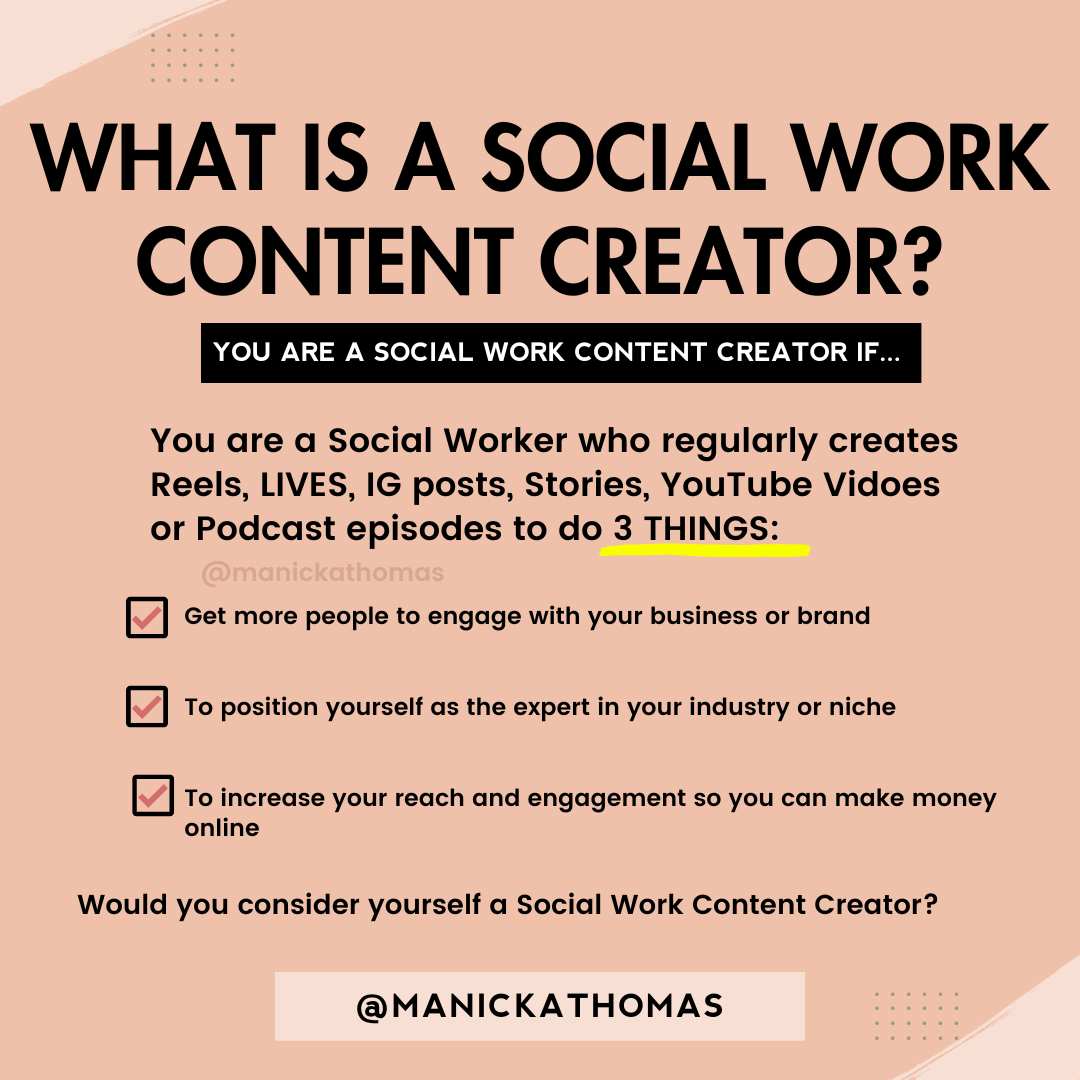
As Social Work Content Creators, we know how to marry our Social Work knowledge with online marketing strategies to fulfill our desire to do socially good work.
THREE LEVELS OF PROFESSIONALISM
I’ve really been giving a lot of thought to how I can help Social Workers create a clear path to entrepreneurship, if in fact that is your goal. Since you’re reading this blog post..I think it’s safe for me to say, that is what you want. As you transition from employee to entrepreneur, there are three phase of your development that are crucial to your transition. These are phases that I created to help you think about where you are in your journey.
CAREER PROFESSIONAL – THE WORKER
This is where we all start…as the Social WORKER. At this level of professionalism, you are working a full time job for the government, a nonprofit organization, school, hospital or mental health agency. This is the stage of your career where you are developing your skills as a professional, navigating professional work environments, deepening your knowledge around a particular area of expertise and learning to lean into your true passions and skillsets. This is also where you discover where your true passions and skillsets lie.
This level requires, patience with yourself and others, internal self-reflection, and a strong sense of identity. It also requires a keen awareness around when it’s time to tap into that same voice that you use to speak up for others and use it to advocate and speak up for yourself professionally.
SCAFFOLDING PROFESSIONAL – THE BRICK LAYER
At this level of professionalism, you are working a full time job you have a desire for something more. You may have made the decision to start a side hustle or a side business as a speaker, a coach, consultant or Independent Contractor. You understand that these opportunities can create additional sources of income for you, but you’ve not yet figured out how to leverage your knowledge and skills into full time work or full time pay.
This is the stage of your career where you have honed in on your professional skills and knowledge, you have developed a specialized expertise and are sought after to present on topics related to your expertise. You have made some connections in your community and online that have opened up a few opportunities for you, but you don’t quite have the business acumen needed to launch your business full scale. You feel confident in your professional knowledge and skills but may feel like an amateur when it comes to owning and operating a business.
This level requires, self-directed learning, consistency, a mindset shift and the ability to challenge your beliefs around your income growth potential. This is the level where you have to be honest, that you don’t know what you don’t know, but you’re willing to make the commitment and emotional, financial and personal investment to create the Social Work business you envision.
SOCIAL WORK ENTREPRENEUR -THE VISIONARY
In this level of professionalism, you have stayed the course, laid your brinks and have fully transitioned as a full time Social Work entrepreneur. You may be a solopreneur, but you have learned to do it scared, to move in spite of fear and to not let limiting beliefs hold you back from your goals.
This is the level of your career where you are meeting a need in the market and using your creativity to create products and services that help your clients improve the quality of their lives. You are in control of what you create and your new ideas never stop flowing. You have committed to lifelong learning and have acquired a few skills outside of your traditional Social Work skills such as marketing, photography, graphic design, or website creation. You have learned how to create a full-time business but may be at the stage where you want to scale your business or to create more time freedom where you can spend more time with your family and not working in your business.
This level requires, continued learning, understanding the power of scale and leverage and knowing how to automate the systems in your business so that you can make money while you sleep!
CUBICLE WORKING SOCIAL WORKER TO ENTREPRENEUR
Once you have decided where you are in the 3 levels of professionalism, it’s time for you to map out a clear path to transition into a Social Work Content Creator. My goal is to help you to do this without the frustration and overwhelm of getting stuck and not knowing what to do next. You may feel stuck because you don’t know what to offer, who to target, or maybe you don’t know where to find the people who will benefit from AND pay for your products and services.
As long as you have a clear plan for identifying these 5 areas of your Social Work business, you can become a successful Social Work Content Creator. And yes, being a Social Work Content Creator is a business!
1. PAIN-POINT:
You want to identify the major pain point that is faced by your audience. Something that, if they had a magic wand and could make that pain-point go away they would do it in a heartbeat. Your business ideas must be able to alleviate this pain-point for your audience. You then must be able to explain not WHAT you offer, but HOW it will solve the problem. Remember, you have ALREADY been doing this work. This is not new to you. At this stage you want to interview your audience, survey them, ask them questions and learn the language they are using to describe their pain-point.
2. PROBLEM SOLVER:
When you have learned and understood what the pain point is of your audience, then you want to be able to share your story as to why YOU are the person to help them solve this problem. Who have you helped in the past? What results have you achieved for yourself or someone else. The key here is not to go on and on about your certifications, degrees and knowledge, the goal is to position yourself as the expert and to let your audience know why you are uniquely qualified to help them with this problem.
So, you want to educate them about the problem, the consequences if it continues, what risks are involved, what they can stand to lose and how this will keep them from their goals or the life that they want. You want to express the price that your audience pays if this problem persists. And because you know that they REALLY want this problem to go away, your goal is to show up consistently giving helpful tips, strategies, data, tools, checklists, guides, information and industry updates to keep them educated, enlightened and informed. You are not fear-mongering here…you are using language like, “did you know, most people don’t know, have you heard, are you ready to, aren’t you tired of, should you…, these are the pros and cons of…you’re not a doom and gloom problem solver!
For example, if their problem is lack of knowledge about a topic, you show up to educate. If their problem is feeling confused, you show up to teach, step by step. If they are struggling to get over a hump…you show up to clearly lay out the path in a motivating and encouraging way. You want to demonstrate to your audience that you are the person BEST equipped to help them make the pain-point go away. And because you are a Social Worker, you know ALL ABOUT problem solving, just make sure when you are offering to solve the problem that you are equipped to do what you are saying you will do.
Lastly, you want to have a way for your audience to take the next step to work with you. This is called your CALL TO ACTION. I have 2 calls to action in this blog post. One is a more subtle ask to follow me on Instagram (here is another chance to if you haven’t already 🙂 and my other call to action is below…to get on the list for my upcoming training, How To Transition from Cubicle Working Social Worker to Social Work Entrepreneur. The goals is, after you have educated, enlightened, and informed your audience that they would be eager, ready and willing to take the next step with you. You just need to decide what next step you want them to take.
3. PAYMENT:
Once you have identified the pain-point, positioned yourself as the expert problem solver and given your audience their call to action, then you want to offer them a product or service that you are confident will help them, because either it has helped you or you have used it to help someone else. These are a few questions to ask yourself for this step.
- Are there already people in my space offering the same or similar products and services? This could be a good sign for you because it shows demand, but you also want to think about how you can set yourself apart from the competition.
- What will my competitive advantage be that will have clients/customers swipe their cards for my products and services when there are other options to choose from.
- Once they are ready to buy with me, am I prepared and do I have a secured payment processor in place to take customer payments.
4. PERSONA:
When you think about who you want to help and serve this is often defined as your Ideal Customer Persona (ICP). Your ICP is the representative of the kind of customer you want to attract. You create this representative from gathering information and characteristics about the target audience. This helps you better align your messaging to their wants and needs. Think about the type of person that you know will benefit from your products and services. Think about how they talk about their problem and the platforms they use to consume content. This will 1. help you to create your content strategy, 2. will help you know what, how often and where to post.
Nailing down your ICP will be the hardest, yet financially rewarding part of being a Social Work Content Creator. You want to ask yourself these questions:
- Hold old are they?
- What are their values?
- What do they watch, read or listen to?
- Where do they consume content and how?
- What do they do in their spare time?
- What keeps them up at night and
- What are their concerns, fears and worries?
Once you have identified this person, then you want to determine if there is a large enough market of those ideal clients/representatives. You want to know this person’s patterns, behaviors frustrations, thoughts, goals and desires.
5. PURPOSE:
Outside of meeting your financial goals in your Content Creation journey, it is your purpose that will drive you and keep you going. The purpose must be bigger than a paycheck. Are you passionate about the purpose you will be sharing with your audience? Have you formed this into a compelling story that describes your why? This is important because the purpose of your content will help develop the brand, look, feel and aesthetics of your content. This will also help position you in front of your Ideal Customer Persona (ICP). Think about what you want your content to communicate..boldness, independence, luxury, peace of mind, simplicity, freedom, joy, liberation, advocacy, strength. This will factor into your colors, fonts, and messaging. When your ICP see’s your content and hears your messaging, you want them to associate what they see and hear with your brand… you want them to raise their virtual hand and say, yes, she is talking to me!
We covered a lot! But, I couldn’t possibly share all the details of the levels of professionalism and making the transition to become a Social Work Content Creator on this post. If you would like more information about making this transition along with specific examples of what this could look like for you, then make sure to get on the list for my upcoming training, How To Transition From Cubicle Working Social Worker, to Social Work Entrepreneur. Just click below! You will also get a free workbook to go along with the training.

Below are a few more things that we will cover as part of the training:
SOCIAL WORK ESSENTIALS: TRANSITIONING FROM EMPLOYEE TO SOCIAL WORK ENTREPRENEUR
We will cover more of the technical side of what it takes to become a Social Work Entrepreneur:
1. MINDSET SHIFT
The first thing you need is a shift in mindset. Up until this point you have heard ALL the things that people have told you are NOT possible in Social Work…you can’t make a lot of money, your opportunities will be limited if you don’t have your Independent License, you have to choose between doing the work for the impact vs. the income.
You will have to learn how to switch from an employee mindset to an entrepreneur mindset. First, that means remembering that there is not cap on the amount of money you can make as an entrepreneur. You can create any level of business that you want as long as you commit to staying consistent, nailing down your messaging and getting that message in front of the right people, your ICPs.
2. EMAIL LIST
This will be the foundation of your business success. If you think of all Social Media platforms as real estate, then we are operating on “rented land.” The only thing that you can control are the things that you own, which will be your email list. You want to have control of when your ICP sees your message and how often. To start, you want to be able to grow your email list to at least 250 people. This may sound like a lot, but trust me, once you find your ICP, your email list will grow very quickly because they will want to stay connected with you.
3. WEBSITE
Just like your email list, your website is the real estate you own. This is where your ICP will look to connect with you and to get updates on your products and services. Having a perfectly designed website is not necessary to start. You can build up to that. The key here is Continuity. You want your email address, website and social media handles (which I will get to in a sec) to be consistent across all platforms. You want the name you choose to be easy to type, spell and remember.
4. SOCIAL MEDIA PLATFORM
Many Social Workers have mixed feelings about social media. You may have a few pics posted of yourself or of your family and haven’t been strategically using your social media platforms to find your ICP or to grow your email list. Once you are serious about making the transition into entrepreneurship, Social media is an amazing FREE tool to create an engaging community and to develop a relationship with your ICP. And remember how I mentioned before that your goal is to identify the pain-point of your ICP, they will begin to ask you questions or tell you the answers once you begin to ask!
Pick ONE platform that will be the home base outside of your website. Find out where your ICP is consuming content and focus on what they need, want and desire. What is the social media platform your ICP is spending the most time one and is checking FIRST thing in the morning?
5. LEAD MAGNET
This may or may not be a new concept for you, but a Lead Magnet is a free resource that you give to your ICP in exchange for their email address. You can think about it as if you are leading your ICP along a journey to get to know you along with the reasons why they need your products and services. The magnet (free resource) draws them in because it’s the perfect solution to give them a quick win to eliminate their pain-point.
6. PAYMENT PROCESSOR
You’re not officially a business until you make your first sale or receive your first payment. You can have the BEST products and services, but if no one buys, you would have wasted time, money and resources. When your ICP is ready to buy, you want to be fully prepared with a secure payment processor to take your online payments. But, we already talked about this, so you know the deal! 🙂
ARE YOU READY TO GET STARTED?
The road from seeing yourself as a Worker, to defining yourself as a Visionary in your business will be tough, and some days you may feel like quitting. Just remember done is better than perfect and you just need to take imperfect actions everyday to move forward. Continuing to stay stuck will result in your gifts not being shared with those who you want to impact. You may limit your ability to have the freedom you desire and you will continue to play out the “what if” record in your head.
The one thing I want you to take away, is that you CAN become a Social Work entrepreneur and build a business that gives you freedom and fulfillment. Don’t let anyone’s opinions about what Social Workers CAN do or how much money Social Workers CAN make, limit you. Social media has busted the door WIDE open for us to be able to leverage our knowledge and skills to earn an income online. I want as many Social Workers as possible to take advantage of these opportunities just as I have!
I look forward to going on this journey of entrepreneurship with you. Because the world needs to hear your voice and someone needs to hear your story. Take BIG action and create the business that meets the needs of those you were called to serve.
Be sure to sign up for the training below and get your free copy of the workbook!




